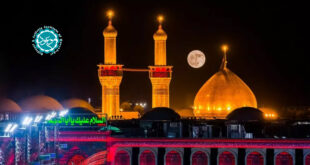Ali bin Abu Talib (A.S.) was the cousin and son-in-Law of Prophet Muhammad (S.A.W.). It is outside the scope of this presentation to record the numerous achievements and merits of Imam Ali (A.S.). His exalted personality is such that even the most learned scholars are at a loss to fathom his greatness.
His birth:
The miraculous circumstance of Imam Ali’s birth gives us an indication of his unique position in relation to Allah (SWT). Imam Ali was born in 600 A.D., on the 13th of Rajab, within the holy precincts of the Kaba, the house of Allah in Mecca, Saudi Arabia. His mother, Fatima binte Asad, experienced labor pains and walked towards the Holy Kaba. Its wall miraculously split, she entered the sanctuary, and the gap sealed itself behind her. Onlookers panicked and rushed to enter it, but could not unlock the door. She emerged three days later, after the baby was born. The Holy Prophet (S.A.W.) was the first person besides Ali’s mother to hold the newborn in his arms, and when Ali opened his eyes, it was the face of the Holy Prophet (S.A.W.) that he first saw. In the history of the Kaba, this is the only known instance of a person being born within its holy precincts.
His ancestry:
Ali’s father was Hazrat Abu Talib, the chief of the Hashemite tribe and an uncle of the Holy Prophet (S.A.W.). Thus, both of Imam Ali’s parents were of noble ancestry, belonging to the tribe of Banu Hashim.
His early life:
When Imam Ali was five years old, the Holy Prophet (S.A.W.) took him under his care in order to ease the financial burden on his uncle Abu Talib, as well as to repay him for the favors he had received from Abu Talib. Imam Ali later said that he was attached to the Holy Prophet (S.A.W.) like a baby camel attached to its mother. When the Holy Prophet (S.A.W.) received his ministry, Imam Ali was the first male to accept his invitation to Islam. According to his own account he prayed with the Prophet (S.A.W.) for several years before the Prophet openly proclaimed his mission.
Ali slept on the Prophet’s bed:
The idol worshippers of Mecca had plotted to kill Prophet Muhammad (S.A.W.) in order to prevent his message of monotheism from spreading. The Holy Prophet (S.A.W.) was informed by Allah (SWT) of the plot, and decided to make Hijra (migration), for the sake of Allah (SWT) to the city of Medina, so as to carry on his mission. He asked Imam Ali, his young cousin, to sleep in his bed in order to distract and confuse the assassins and allow him time to escape. Imam Ali gladly accepted this responsibility, risking his life so that the Prophet’s life would be saved. Imam Ali slept soundly, surrounded by the drawn swords of the Prophet’s blood-thirsty enemies. When asked later on in what state he had spent that night, Imam Ali replied that he had never slept so peacefully before in his life! Allah was so pleased with this exemplary act of sacrifice that He revealed the following verse of the Qur’an: “And there is the type of man who gives his life to earn the pleasure of Allah; and Allah is full of kindness to (His) servants.” (2:207)
The renowned historian Jalaluddin Suyuti writes in Tarikh al-Khulafa, or The History of the Caliphs, on the authority of Hazrat Ibn Abbas, that in the Qur’an, three hundred verses have been revealed concerning, and in praise of, Ali. Scholars, historians, and leaders of all faiths and beliefs the world over have written extensively on the merits of Imam Ali.
Two landmark events.
During the ministry of the Holy Prophet (S.A.W.), two events in particular shed light on the unique distinction and position of Imam Ali. One occurred at the very beginning of the Holy Prophet’s (S.A.W.) mission, and the other was near the end of the Prophet’s life.
The Feast of Dhul ’Asheera.
In the fourth year of his ministry, the Holy Prophet (S.A.W.) was instructed through the Qur’anic revelation to warn his near relatives and proclaim to them the oneness of Allah (SWT), to let them know his own position as the last messenger of Allah (SWT), and to invite them to Islam. The verse begins: “And warn thy nearest kinsfolk.” (26:214). He invited the respected elders of the Quraish tribe to a well-prepared feast, and afterwards invited them to Islam. He furthermore announced that the first among them to accept his message and be his aide and helper in his prophetic mission would become his heir and successor. Those who were present sat in silence. Imam Ali, then a young teenager, stood up and declared that he would accept the Holy Prophet’s (S.A.W.) message and be his helper. Twice, the Holy Prophet (S.A.W.) asked Imam Ali to sit down, and then invited any of the others, but to no avail. At the third appeal, Imam Ali stood up again and boldly volunteered to take the responsibility. This time the Holy Prophet (S.A.W.) smilingly declared Ali to be his successor and helper. In the words of the famous historian, John Devonport, the Holy Prophet (S.A.W.) threw his arms around the courageous youth, and pressed him to his bosom, declaring, “Behold, my brother, executor of my will, and my successor! All of you should listen to him and obey him.” Those in attendance laughed and ridiculed the Holy Prophet (S.A.W.), and furthermore taunted Abu Talib by saying that he had just been commanded to listen to and obey his own son.
Yet, true to his word, Imam Ali protected, defended, and followed the Holy Prophet (S.A.W.) like a shadow, shielding him from enemies and being ever-ready to give his life in the service of Islam. Whenever others deserted the Holy Prophet (S.A.W.), Imam Ali remained with him.
The event of Ghadir-e-Khum.
In the 10th year after Hijra, when the Holy Prophet (S.A.W.) was returning from his last Hajj, known as the Farewell Pilgrimage, he received this revelation brought by the Angel Gabriel at a valley known as Ghadir-e-Khum: “O Apostle! Proclaim that (message) which hath been sent down to thee from thy Lord. If thou did not, thou wouldst not have fulfilled and proclaimed His (entire) message! And Allah will defend thee from the mischief of men, for Allah guideth not those who reject faith.” (5:70).
Upon receiving this verse from Allah (SWT), the Holy Prophet (S.A.W.) immediately halted the journey and called back all those who had gone ahead, and waited for those still behind. He then delivered what is known as “the Last Sermon.” He forewarned that his end was near, and recounted his services to the Muslims, their duties to Allah (SWT), and their obligations to one another. Towards the end of this sermon, he asked, “The Almighty Allah is my Maula (master) and the Maula of all those who believe, and I am similarly the Maula of all those who believe, and I have more right over the believers’ lives than they have on their own selves; do you believe in this claim?” All of them replied in one voice, “Yes, O Messenger of Allah!” Twice more he asked this question, and twice more he received the same reply.
At this point, he solemnly declared, “Then hear and remember: of whomsoever I am the Maula, this Ali is also his Maula! He is to me what Aaron was to Moses. O Allah! Be a friend to him who befriends him and enemy to him who opposes him! Help those who help him and frustrate those who frustrate him!” While he was saying these words, he raised Imam Ali in his arms above his head so that all those in the gathering may have a look at the man who was to be their Maula.
Thereupon, the Holy Prophet (S.A.W.) received this final revelation of the Qur’an from Allah (SWT): “This day have I perfected your religion for you, and completed My favor upon you, and have chosen for you Islam as your religion!” (5:3).
After this, the Holy Prophet (S.A.W.) had a tent erected, and inside this tent Imam Ali was seated, so that people could enter and pay homage to him and address him as Ameer-ul-mu’mineen (Commander of the Faithful). History records that the first person to congratulate and address him was Umar ibn al-Khattab who said, “Congratulations, O son of Abu Talib! Today you have become my Maula and the Maula of every believing man and woman.”
(This particular event has been recorded in Imam Ahmed ibn Hanbal’s Musnad, v. 5, p. 281, and Imam al-Ghazzali’s Sir-ul-Alameen. Maulana Askari Ja’fari states that 153 famous authors have recorded the event of Ghadir-e-Khum in their works.)
 Mouood Mouood English Edition
Mouood Mouood English Edition




